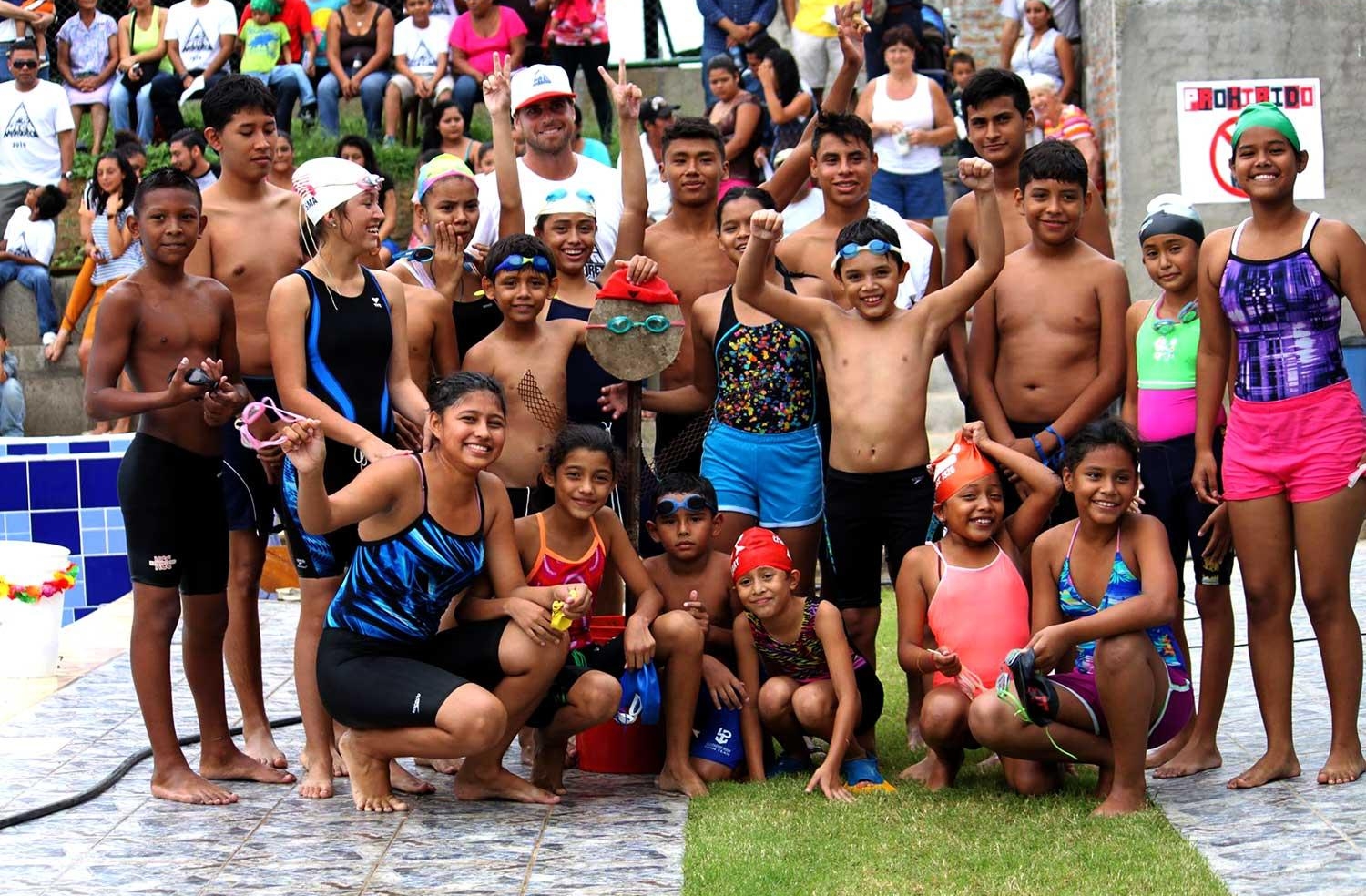
Former UVA Swimmers Reunite, Help Nicaraguans Excel in the Pool and in School
By Caroline Newman
While volunteering with a nonprofit in Nicaragua’s capital city of Managua, former University of Virginia swimmer Timmy Hayes started teaching local children how to swim — and found his next career.
“At first it was just about eight kids, swimming in jeans and T-shirts with no goggles,” said Hayes, a Spanish major who graduated in 2011 and worked as a swim coach in Jackson Hole, Wyoming before volunteering in Nicaragua. “I got to know a lot of the kids and saw an opportunity to help them get a more rigorous education, as public schools in Nicaragua can be overcrowded and lacking in resources.”
In February 2014, Hayes, who was part of four ACC team championships at UVA, reached out to teammate Scot Robison (Class of 2018), a former team captain now in his first year at the UVA Darden School of Business, and former Clemson University swimmer Kyle Shoemaker. The trio co-founded Nica Nadadores, a nonprofit that, in addition to traditional swim coaching, offers local children scholarship and mentorship opportunities to help them get the best possible education.
“Timmy told me about the need for organizations like this in Managua and the huge opportunity to help kids there,” said Robison, who joined Hayes in Managua after leaving an investment banking job in Charlotte, North Carolina. “We were both swimmers and we knew how much the sport had given us and how much it could teach young people.”
Today, Hayes runs Nica Nadadores — “swimmers” in Spanish — in Managua while Robison takes classes at Darden and Shoemaker provides support from the U.S. The program has enrolled 90 children ranging from pre-school to high-school age, and provided 40 scholarships, ranging from funding for preschool programs to university scholarships. There are daily swim practices and monthly community service projects, as well as constant mentorship as Hayes and a team of volunteers work with students’ parents to track report cards, encourage students to excel in the classroom and provide tutoring and school supplies.
“The biggest takeaway for the kids is being part of something bigger, part of a team and part of this organization that is a lot like family,” Hayes said. “I hold them to certain expectations in the pool and that sense of duty and expectation translates into the classroom, too.”
Many in the program come from impoverished families that make the equivalent of about $2 per day. Across Nicaragua, 46 percent of children do not advance past ninth grade and 46.2 percent of the population lives below the poverty line. The success stories from Nica Nadadores offer a powerful counterpoint to such grim statistics.
Hayes recalls one teen, Fernando, who was a sixth-grader in the local public school when he enrolled in Nica Nadadores.
“He really clung to the program and fell in love with swimming,” Hayes said. “We got him a scholarship to a private school, and after one year there, he wanted to learn English and study at an international academy.”
Hayes spent a year teaching Fernando to read, write and speak English and in September, the teen enrolled in an international academy, where classes are taught entirely in English and students receive a college preparatory education.
“He is doing really well,” Hayes said. “He is a leader in our program now and is teaching younger kids how to swim through our coaching program.”
Another student, a girl named Sarai, was one of the first to attend Hayes’ swim classes. Nica Nadadores provided her a scholarship to a nearby private school.
“She was kind of timid at first, and she comes from one of the poorest families on our team,” Hayes said. “She is at the top of her class now in school, got third place in the 50-meter backstroke at a recent meet, and has really grown socially, inviting lots of her classmates to join our program.”
As the nonprofit has grown, Hayes and his co-founders have searched for additional ways to provide new opportunities for the kids they serve. They have started sponsorship programs where young American swimmers and their families can sponsor a swimmer in Nicaragua, covering that child’s education and expenses. There are also exchanges where Nicaraguan swimmers can visit swim teams in the United States for a few weeks, often forging pen pal relationships that continue for many months.
“We have tried not to do too much crowd-funding and instead create more meaningful sources of funding where people are involved in the program and its success,” Hayes said.
Robison expects his Darden education will also be helpful in sustaining the program’s growth.
“Darden is everything I expected it to be and more,” he said. “I am learning more about how to be a manager, and even when we are not talking specifically about nonprofits, I find myself thinking about how to relate those concepts back to the nonprofit space.”
For now, Robison expects to return to work in the business world after graduation while still remaining involved with Nica Nadadores. Hayes will stay on in Managua, where he is currently hiring a program director to assist with the day-to-day management of the organization.
Nearly two years in, he hopes that the program’s success is just getting started.
“Now, these kids can see opportunities for bigger-picture goals and think about what they want to do with their lives five years from now, 10 years from now,” Hayes said. “We are helping them get an education and maybe make life a little brighter for the next generation.”
This story originally appeared on UVAToday.com.
The University of Virginia Darden School of Business prepares responsible global leaders through unparalleled transformational learning experiences. Darden’s graduate degree programs (MBA, MSBA and Ph.D.) and Executive Education & Lifelong Learning programs offered by the Darden School Foundation set the stage for a lifetime of career advancement and impact. Darden’s top-ranked faculty, renowned for teaching excellence, inspires and shapes modern business leadership worldwide through research, thought leadership and business publishing. Darden has Grounds in Charlottesville, Virginia, and the Washington, D.C., area and a global community that includes 18,000 alumni in 90 countries. Darden was established in 1955 at the University of Virginia, a top public university founded by Thomas Jefferson in 1819 in Charlottesville, Virginia.
Press Contact
Molly Mitchell
Senior Associate Director, Editorial and Media Relations
Darden School of Business
University of Virginia
MitchellM@darden.virginia.edu




